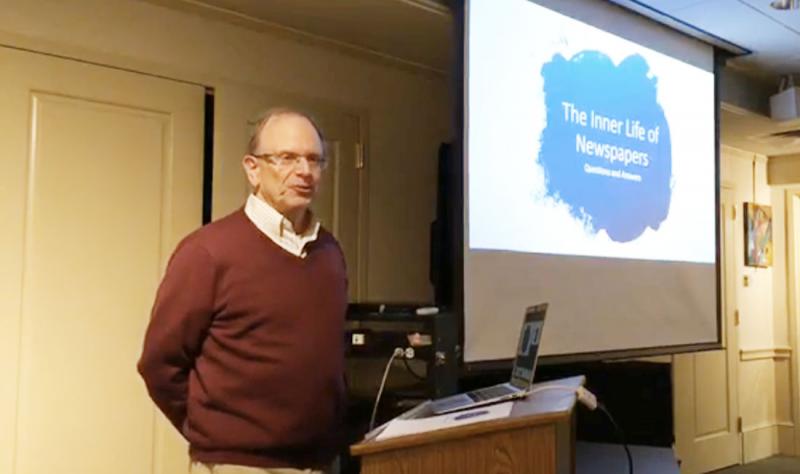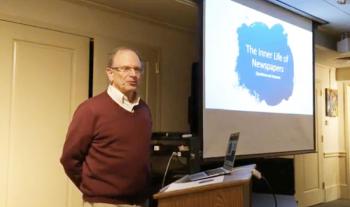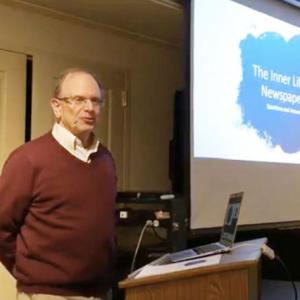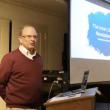What journalists can do to maintain trust and what citizens need to do to be smarter consumers of media
CAMDEN—Earlier this month, Matthew Storin, the former editor of the Boston Globe, gave a talk to an audience of some 70 people at the Camden Public Library in conjunction with The Camden Conference.
At a time when the mainstream media is often under siege, when reporting objectively in a post-truth era has become one of journalists’ biggest challenges, Storin had some stories to tell.
But first, a little bit about Storin himself. Prior to the Globe, he was editor of the Chicago Sun-Times, executive editor of the (NY) Daily News, editor of Maine Times and national editor of U.S. News & World Report. His reporting career, which began in his hometown at the Springfield (Mass.) Daily News, included stints in Washington for the Griffin-Larrabee News Bureau and later the Globe, for whom he covered Congress, the White House, and later Asia. Based in Tokyo, he covered the late stages of the wars in Cambodia and Vietnam. After retiring from the Globe, he served as associate vice president for communications at his alma mater, the University of Notre Dame, where he also was concurrent professor of journalism.
PenBay Pilot contacted Storin after his Camden Public Library talk to ask him what were some of the audience’s major questions.
Pilot: what did people want to know about the daily life of journalists and the inner world of newspapers?
Storin: One of the questions I often get asked, is ‘Are most newspapers liberal?’ The short answer is yes, but it’s more complicated than that.
A certain type of person is attracted to journalism and that type tends to “want to comfort the afflicted and afflict the comfortable.’ That is the role of the press, though oversimplified. When newspaper reporters report on something the Trump administration did or said, that’s the purpose of journalism. Then, there will be, in my opinion, another three stories that go out of their way to find something negative that might not necessarily be an important story. For instance, Ivanka Trump went to Japan about a year ago and there were fewer than expected in attendance and they made a story out of that. And I think, ‘big deal, it’s not that important.’ On the other hand, I point out to my conservative friends when they start railing about the press is that almost every scandal you know about Hillary Clinton was reported first in The New York Times.
Pilot: Something many people don’t understand is that all journalists who earn their educational degrees are trained in the principles and values of ethical journalism—correct?
Storin: Yes, and also they are trained to be looking for abuses of power and government overreach. And that’s where you get to the question of what some detached observers might say is bias. I will say that journalists definitely tend to have a trust in government in the general sense. Now at the same time, they are quick to leap on what they perceive is an abuse by government, particularly in the financial area, say government overspending or some wasteful program. But what they’re really looking for is a story. Journalists ideally would write a story about their best friend if their best friend had screwed up.
Pilot: Touching on bias, because journalists are also human beings with their own political views, what, is the essential job of the ethical, fair journalist?
Storin: This is the most challenging time I’ve seen for journalists in my professional life. The combination of lies and out-of-context statements by this administration, coupled with the echo chamber of some Fox News broadcasts, primarily Fox and Friends, threaten the very bedrock of news reporting. (I’m not talking about opinion commentators.) Obviously it is more important than ever to be accurate in reporting, but also in the choice of language and topics, newspapers need to be careful not to overreact. Some reporting in our national newspapers is absolutely essential to holding this administration to account, but I think there are excesses. Sometimes, to use an old expression, stories make ‘mountains out of molehills’ just because Trump is such a different character, particularly on Twitter.
Pilot: What can journalists do to continue to earn and keep the trust of their readers and to maintain their own credibility?
Storin: Other than what I’ve already said, they should stick to facts on social media, primarily Twitter and Facebook. And in an appearances on TV, they should be extremely judicious in their language. I also think news organizations need to reveal more about their staff people, making clear that they are folks just like everyone else, doing a job as best they can. I notice that both The New York Times and The Washington Post are doing this a bit, but they need to do more.
Pilot: What can the average citizen do to become better informed, to seek out fair and balanced journalism and to positively participate in meaningful discussion online?
Storin: They need to make at least some effort. I’m afraid many of us do not. They need to be sure they know the organization producing what they are reading, particularly online, I think someone who reads either the Times or the Post, should also read The Wall Street Journal, including its editorial page. The latter is a far better venue for conservative opinion than much of Fox News or other conservative media. The Journal’s news reporting (separate editors from the opinion pages) is straighter than the Times or Post.
To test the “truthfulness” factor of any story one finds online or to determine whether a source is “fake news” type the name of the media source in Media Bias Fact Check website.
The Camden Conference’s 2020 theme is “The Media Revolution: Changing The World” to be held February 21-23 in Camden, Maine. FMI: Camden Conference.
Kay Stephens can be reached at news@penbaypilot.com
Event Date
Address
United States

































